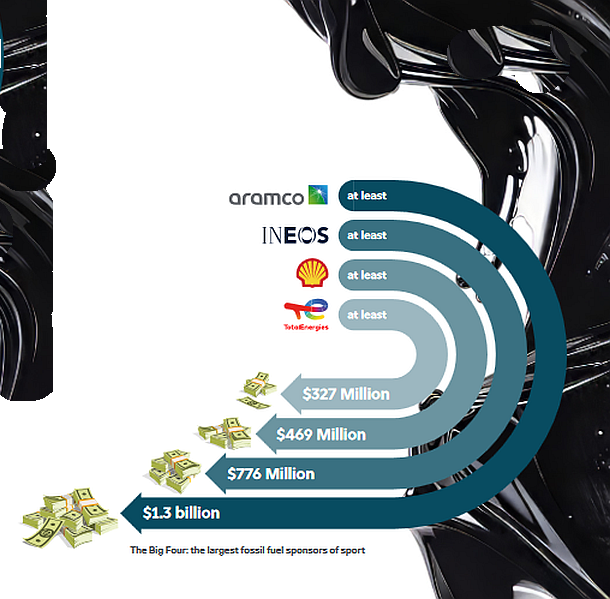Sports have a unique ability to bring people together, spark passion, and create a sense of community worldwide. Whether it’s soccer, basketball, or any other game, fans rally behind their favorite teams and players with unwavering enthusiasm. Yet, behind the cheers and celebrations often lies a troubling reality: sportswashing.
Sportswashing, much like greenwashing, is a tactic used by corporations or governments to improve their image through sports sponsorships while masking harmful activities. Among the worst offenders are major fossil fuel companies, which pour billions into sponsoring beloved teams and events to divert attention from their environmental damage.

Fossil Fuel Companies and Sportswashing
Some of the biggest names in the fossil fuel industry actively engage in sportswashing. Take Saudi Arabia’s Aramco, for instance. As one of the largest carbon emitters globally, Aramco has invested over $1 billion in sponsorships spanning motorsports, football, and cricket.
Similarly, TotalEnergies sponsors high-profile events like the Rugby World Cup and the Africa Cup of Nations, diverting focus from its role in environmental harm and the displacement of indigenous communities.
Shell, another industry giant, sponsors motorsports, American football, and basketball. These sponsorships shield the company from scrutiny over its significant greenhouse gas emissions.
Collectively, oil and gas companies have spent over $5.6 billion on sportswashing campaigns, which normalize their brands and worsen climate change.
Paris 2024 Olympics: A Sustainability Letdown
The Paris 2024 Olympic Games were billed as a showcase of sustainability but failed to live up to the promise. While Toyota, a sponsor, provided electric vehicles for the event, the company’s broader environmental record tells a different story. With its production of fossil fuel-powered cars, Toyota’s emissions rival those of 2,000 coal plants annually. This sponsorship exposed the gap between sustainability claims and actual corporate responsibility.

Pushing for Change
The tide is slowly turning, thanks to athletes and environmental advocates demanding reform. After the Paris Olympics, Olympic and Paralympic athletes urged the International Olympic Committee (IOC) to reconsider partnerships with companies like Toyota. They highlighted the tangible effects of climate change—rising temperatures and deteriorating air quality—on athletes’ performance and health.
A Vision for a Sustainable Sports World
To tackle sportswashing, sports organizations must implement stricter ethical guidelines, favoring sponsors committed to sustainability and human rights. Athletes can use their influence to push for transparency and challenge harmful sponsorships, while fans can hold teams and sponsors accountable for their choices.
By standing together against sportswashing, the global sports community can uphold values of integrity, transparency, and environmental stewardship—ensuring that the sports we cherish align with the principles we hold dear.
Reference- Climate Impact Trackers Asia, New Weather Institute, EcoAthletes letter, BBC, badvertising







